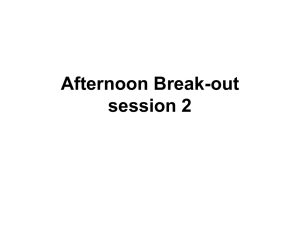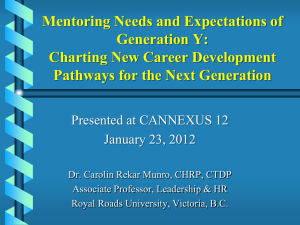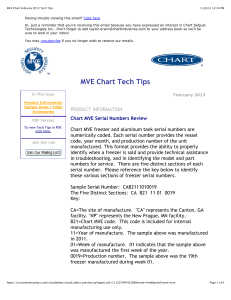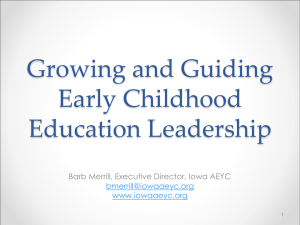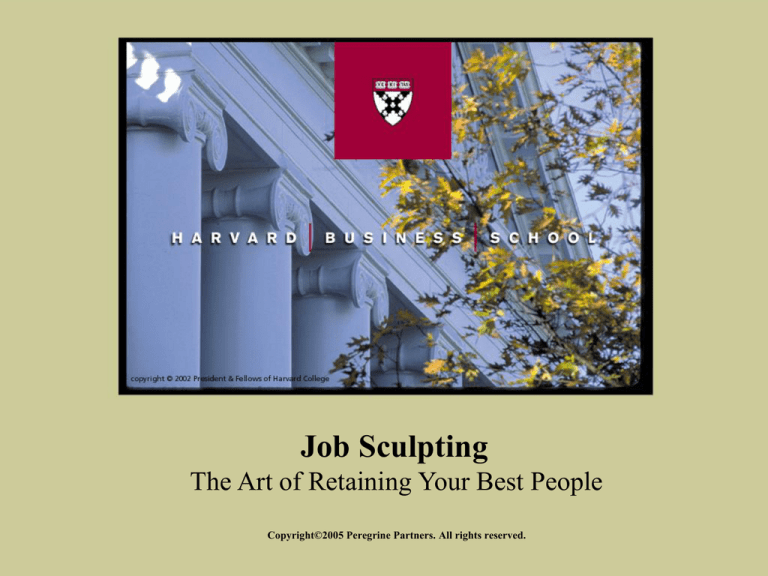
Job Sculpting
The Art of Retaining Your Best People
Copyright©2005 Peregrine Partners. All rights reserved.
Person By Person
Retention of talent takes place when the skill of
the individual manager makes it happen by
managing on the basis of individual psychology.
Work Commitment
• Leadership
• Compensation
• Self Actualization
Leadership
•
•
•
•
Trust
Vision
Effectiveness
Presence
Compensation
• It is always an important issue but often not the
most important
• Extraordinary compensation does not guarantee
deep commitment
• An “it’s all about money” model for retention
comes at a very high (literal) cost
Self Actualization
•
•
•
•
Passion
Connection
Achievement
Power
Self Actualization: Passion and Productivity
When we are working from our deepest interests
we are vastly more productive. We identify our
job as a fulfilling experience. We want to stay and
we want to do more.
As Managers We Must Do Three Things
1. Recognize the deep interest patterns of our most
valued employees
2. Help them to recognize and articulate those
patterns
3. With them, sculpt a role that allows for the
realization of these interests while accomplishing
the organization’s goals
Business Core Functions
•
•
•
•
•
•
•
•
Application of Technology
Quantitative Analysis
Theory Development and Conceptual Thinking
Creative Production
Counseling and Mentoring
Managing People and Relationships
Enterprise Control
Influence Through Language and Ideas
Application of Expertise
•
•
•
•
Application of Technology
Quantitative Analysis
Theory Development and Conceptual Thinking
Creative Production
Working With People
• Counseling and Mentoring
• Managing People and Relationships
Control and Influence
• Enterprise Control
• Influence Through Language and Ideas
Your Most Valued Employee
• Which two Core Functions are most meaningful
for your MVE?
• What is the relative importance of these Core
Functions
Business Core Functions
•
•
•
•
•
•
•
•
Application of Technology
The general use of technology to accomplish business objectives
Quantitative Analysis
Business problem-solving that relies on mathematical analysis
Theory Developmental and Conceptual Thinking
Activities involving broadly conceptual approaches to business problems
Creative Production
Business roles that require pure creativity: creating and idea, product or strategy where
none existed before
Counseling and Mentoring
Developing relationships as an integral part of business work. Examples: coaching,
training and mentoring, customer relationships
Managing People and Relationships
Working directly and consistently with groups of people in the roles of manager,
director or supervisor
Enterprise Control
Having ultimate strategic and decision-making authority for complete operations
Influence Through Language and Ideas
Exercising influence through the skillful use of written and spoken language
Your Other Most Valuable Employee
• Which two Business Core Functions are most
meaningful for you?
• What is the relative importance of these Core
Functions?
Patterns of Satisfaction
People with different Core Function profiles are
excited by different roles in organizations
General Managers
AT
QA
TD
CP
CS
MP
Business Core Function
EC
IN
Marketing Managers
AT
QA
TD
CP
CS
MP
Business Core Function
EC
IN
Investment Banking
AT
QA
TD
CP
CS
Business Core Function
MP
EC
IN
Finance In Corporate Settings
AT
QA
TD
CP
CS
MP
Business Core Function
EC
IN
Productions and Operations Management
AT
QA
TD
CP
CS
MP
Business Core Function
EC
IN
Human Resources Management/
Corporate Training
AT
QA
TD
CP
CS
MP
Business Core Function
EC
IN
Sales and Sales Management
AT
QA
TD
CP
CS
MP
Business Core Function
EC
IN
Managers of Information Systems
AT
QA
TD
CP
CS
MP
Business Core Function
EC
IN
New Product Development
AT
QA
TD
CP
CS
MP
Business Core Function
EC
IN
Public Relations and Communications
AT
QA
TD
CP
CS
MP
Business Core Function
EC
IN
How to Keep Them
Job Sculpting Highlights for
Dominant Core Functions
Application of Technology or Quantitative
Analysis Dominant
• Acknowledge and authorize their expert role
(anoint your gurus)
• Tie compensation to expertise growth as well as
management level
• Fund training and professional affiliation
• When appropriate, invite their contribution to
management decisions
Creative Production Dominant
• Will want “early phase” and “blank page”
involvement
• Will want new projects more frequently (shorter
time horizon)
• Routine or steady-state will send them toward the
exits
• Creativity is a plus; restlessness is a management
challenge
Theory Development and Conceptual Thinking
Dominant
• Intellectual challenge is paramount
• Must have steady supply of problems to solve
• Involvement with strategy, big picture, vision;
(make sure they are invited to the brain-storming
sessions)
Counseling and Mentoring Dominant
• Relationships are central source of job satisfaction
• Will raise “value” issues and look for
organization’s responses
• Counseling/mentoring role, with subordinates and
customers highly valued
• Guard against diminishing counseling/mentoring
role with promotion (extra one-on-one time may
seem inefficient, but it may keep a star performer)
Managing People and Relationships Dominant
• Needs increasing management responsibility
• Roles seen as “staff” or individual contributor a
problem
• Action orientation: needs to be “in the thick of
things”
Enterprise Control Dominant
• Wants responsibility and visibility (can be
unrealistic)
• Wants ultimately to be a “player” in the major
effects of the organization
• Even at earliest career stages will be restless for
evidence of progress toward the above
• Be careful before you interpret early career
restlessness as arrogance
Influence Through Language and Ideas
Dominant
• Wants to be “at the boundary” of the team,
business unit or whole organization
• Wants “high interpersonal transaction”
environment
• Needs credible evidence of growing influence
(invited to the meetings, etc.)
• Communicator, translator and broker roles valued
Job Sculpting
• Both parties recognize BCF profile
• Both parties aware of organization’s goals
• Next job “sculpted” with both profile and goals in
mind
• Pay attention to Connection, Achievement and
Power
Self Actualization
•
•
•
•
Passion
Connection
Achievement
Power
Connection
• Affiliation: Which relationships are most
important?
• Attention: How does your MVE get it?
• Authority: What is the quality of the parental
dynamic for your MVE?
Affiliation
As a manager, what can you do to enable the
affiliative connections that are most important for
your MVEs? What have you done that has
disrupted them?
Attention
Consider individual difference in terms of:
• Level and type of daily social interaction preferred
• Level of inclusion in information exchange
• Level of inclusion in formal meetings
• Invitation to share perspective
• Frequency of one-on-one meetings
Authority
Each of us brings to our work situation a personal
history of relationship with more powerful others,
based on the primal child-parent dynamic. This
history is emotionally colored and unconscious to
varying degrees.
Stances Toward Authority
(MVEs can fall into any category)
• Engaged
• Reactive
• Laissez-Faire
Stances Toward Authority
You cannot change your MVE’s stance. Being
aware of it will allow you to anticipate his or her
response and generally make things much easier.
Self Actualization
•
•
•
•
Passion
Connection
Achievement
Power
Achievement: What Counts for your MVE?
• Challenge: I have never done it before or I did it
better than anyone else
• Learning: I will gain new skill and knowledge
• Authorship: I will create something that has my
name on it; my professional identity extends
beyond the organization
• Recognition: My identity in the organization will
be enhanced (Ex: promotion, award)
Self Actualization
•
•
•
•
Passion
Connection
Achievement
Power
Power: Being Able to Act
How will you sponsor the power relationships your
MVE needs to succeed?
• Authorize (explicit, public)
• Connect
• Promote
• Protect
Self Actualization
•
•
•
•
Passion
Connection
Achievement
Power
Measuring Business Core Functions
• “Job Sculpting” HBR article
• CareerLeader Online assessment program
®
Continuing the Conversation
Tim Butler
617-776-3465
tbutler@hbs.edu




